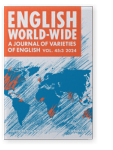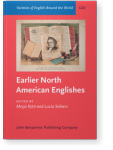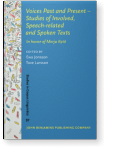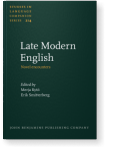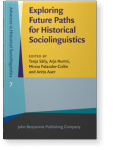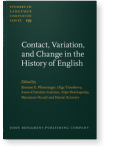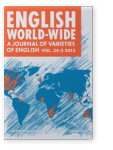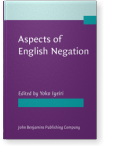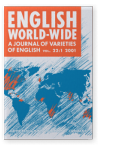Lieselotte Anderwald
List of John Benjamins publications for which Lieselotte Anderwald plays a role.
Journal
2022 Historical retention, progressive nation, or the eye of the beholder? : The evolution of morphological Americanisms Earlier North American Englishes, Kytö, Merja and Lucia Siebers (eds.), pp. 89–122 | Chapter
This article investigates the time-depth of three groups of present-day morphological Americanisms: past participle gotten, new strong verbs (dove, snuck), and regularized verbs (burned, learned, dreamed). Relating corpus-linguistic evidence to metalinguistic comments shows that even if the… read more
2020 Chapter 12. American English gotten : Historical retention, change from below, or something else? Voices Past and Present - Studies of Involved, Speech-related and Spoken Texts: In honor of Merja Kytö, Jonsson, Ewa and Tove Larsson (eds.), pp. 187–204 | Chapter
I trace the history of the American English (AmE) past participle gotten, widely (but wrongly) regarded as a historical retention of an earlier BrE form. As corpus data shows, gotten almost died out in American English as well, but was then revived. Although get is found mainly in speech-related… read more
2020 The myth of American English gotten as a historical retention Late Modern English: Novel encounters, Kytö, Merja and Erik Smitterberg (eds.), pp. 67–90 | Chapter
In this article, I investigate where and when the myth of American English as a conservative variety originates, and how it has become linked to the verb form gotten in particular. Drawing on corpus materials, prescriptive grammar writers of the time, publications on Americanisms, and… read more
2017 “Vernacular universals” in nineteenth-century grammar writing Exploring Future Paths for Historical Sociolinguistics, Säily, Tanja, Arja Nurmi, Minna Palander-Collin and Anita Auer (eds.), pp. 275–302 | Chapter
This article investigates nineteenth-century prescriptive grammar writing for comments on four purported “vernacular universals”: multiple negation, adverbs without -ly, you was, and existential there is/there was with plural subjects. These features were already going out of (written) language… read more
2014 “Pained the eye and stunned the ear”: Language ideology and the progressive passive in the nineteenth century Contact, Variation, and Change in the History of English, Pfenninger, Simone E., Olga Timofeeva, Anne-Christine Gardner, Alpo Honkapohja, Marianne Hundt and Daniel Schreier (eds.), pp. 113–136 | Article
My paper is a close analysis of prescriptive comments on the progressive passive over the course of the nineteenth century, based on my collection of 258 nineteenth-century grammar books. I investigate how the progressive passive was evaluated, which language ideologies were involved, and what the… read more
2013 Natural language change or prescriptive influence? Throve, dove, pled, drug and snuck in 19th-century American English English World-Wide 34:2, pp. 146–176 | Article
This paper investigates five morphological Americanisms in their diachronic development since 1810 on the basis of data from the Corpus of Historical American English, namely the past tense forms of THRIVE, DIVE, PLEAD, DRAG, and SNEAK. THRIVE is a clear case of an irregular verb becoming regular;… read more
2005 Negative Concord in British English Dialects Aspects of English Negation, Iyeiri, Yoko (ed.), pp. 113–137 | Article
2001 Was/Were-variation in non-standard British English today English World-Wide 22:1, pp. 1–21 | Article
In this article, the past tense system of the verb to be in modern informal spoken British English is investigated. Variation is endemic, but an in-depth investigation across individual dialect areas shows that three generalization strategies can be distinguished. Of these, two lead to a… read more
